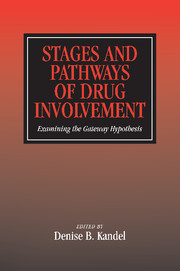Book contents
- Frontmatter
- Contents
- List of Contributors
- Foreword
- Preface
- Part I Overview
- Part II Recent Substantive Findings: What Do We Know About Stages of Drug Use, Risks, and Protective Factors?
- Part III Impact of Prevention Interventions: A Test of the Progression Hypothesis
- Part IV Methodological Issues and Approaches: Advantages and Limitations of Alternate Methods
- Part V Animal Models and Biological Processes: Implications for Drug Progression
- Part VI Conclusion
- Index
Foreword
Published online by Cambridge University Press: 25 July 2009
- Frontmatter
- Contents
- List of Contributors
- Foreword
- Preface
- Part I Overview
- Part II Recent Substantive Findings: What Do We Know About Stages of Drug Use, Risks, and Protective Factors?
- Part III Impact of Prevention Interventions: A Test of the Progression Hypothesis
- Part IV Methodological Issues and Approaches: Advantages and Limitations of Alternate Methods
- Part V Animal Models and Biological Processes: Implications for Drug Progression
- Part VI Conclusion
- Index
Summary
A key element to thoughtful discussions on this topic is alluded to in the title of this book, Stages and Pathways of Drug Involvement: Examining the Gateway Hypothesis. Dr. Kandel and her colleagues do an excellent job of presenting what science has to offer on this subject. Although the verdict is still out on whether or not the Gateway Hypothesis represents a true causal progression, one point is certain: There is nothing inevitable about drug progression from alcohol and/or nicotine to drugs such as cocaine and heroin.
This notion of inevitability creates a problem in the way the Gateway Hypothesis has been used in policy formation. There is a connotation associated with this concept that the original researchers who coined the phrase probably never intended. Most of the world has interpreted the pattern or sequence of drug use as a pathway, whereas at best it is more like a funnel. According to this metaphor, everyone who has ever tried or used drugs is at the large end of the funnel, and, although events may foster more drug use for some individuals, there remains only a small subset of users who actually go on to become addicts at the other end of the funnel.
- Type
- Chapter
- Information
- Stages and Pathways of Drug InvolvementExamining the Gateway Hypothesis, pp. xiii - xivPublisher: Cambridge University PressPrint publication year: 2002
- 2
- Cited by



